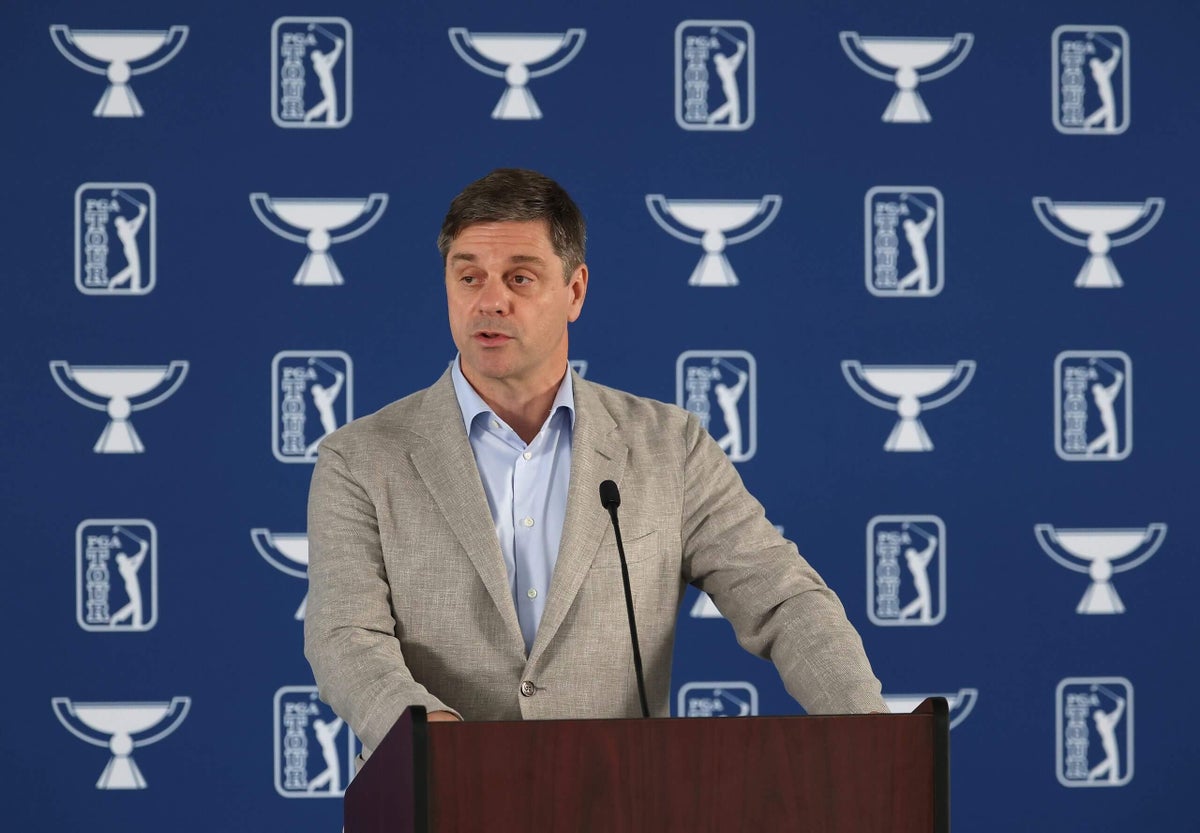Brian Rolapp’s first message as PGA Tour CEO: He’s not afraid to change everything.
Rolapp’s first public move was announcing a Future Competition Committee, chaired by Tiger Woods, with the aim of a “holistic relook at how we compete on the tour.”
The committee, announced Wednesday in Atlanta before the Tour Championship, plans to find the “optimal competitive model” for professional golf after several years of change and turmoil.
“The goal is not incremental change,” Rolapp said. “The goal is significant change.”
Woods went as far on social media as to call it a “next era” for the PGA Tour.
This committee is a mixture of top player voices and business advisers, including Fenway Sports Group principal John Henry from the private equity consortium Strategic Sports Group, which invested $1.5 billion into PGA Tour Enterprises last year. It also includes former Boston Red Sox and Chicago Cubs executive Theo Epstein.
Rolapp said he wants to ensure golf is the best version of a meritocracy, where top players compete together more often. The regular season and postseason should be easy for fans to understand.
The new CEO joined the tour this summer after spending the last two decades at the NFL, most recently serving as the league’s chief media and business officer.
PGA Tour commissioner Jay Monahan, who introduced Rolapp, will stay on through his contract’s 2026 end despite Rolapp taking control.
“Time will demonstrate that (Rolapp) is exactly the right leader for the PGA Tour at this moment in time and this moment in its evolution,” Monahan said. “And that’s why he already enjoys such broad support from our players, partners and team members who have had the opportunity to spend time with him.”
Honored to serve as Chairman of the Future Competition Committee. This is about shaping the next era of the PGA TOUR — for our fans, players and partners.
Thanks to @BrianRolapp for his vision and leadership, and grateful to the committee members for their willingness to… https://t.co/d1SEdKTg4C
— Tiger Woods (@TigerWoods) August 20, 2025
Only on the job for three weeks, Rolapp said he has not spoken with anyone from the Public Investment Fund of Saudi Arabia — talks between the two sides have stalled since multiple White House meetings in February — and did not offer any specifics on plans for the SSG investment. Much of his focus on Wednesday was on the Future Competition Committee and setting a strong mandate.
“I don’t think fans should expect anything we’re doing now to exist in perpetuity,” he said.
For example, the PGA Tour announced in May that it decided to change the Tour Championship midway through the season, removing the staggered starting-strokes format it’s used since 2019. That provided proof of the tour’s willingness to make improvements quickly, and that there’s no correct timeline for any further changes in the format. It will make changes when leadership agrees it’s necessary.
“I think the right answer to that is we will take as much time as is needed to get it right, at least the initial time out, but we’re going to aggressively move,” Rolapp said. “So I would like to put in the right competitive model as soon as we can.”
Regarding his core principle of parity, Rolapp said one of the best things golf has going for it is that the difference between the fifth and 35th best player in the world is razor thin. That’s something he wants to lean into, although it’s unclear how.
As for simplicity, he alluded to a need for improvement in fans’ understanding of the stakes of any tournament.
“If this person wins, if this person loses, if this person finishes here on the leaderboard, what does that mean and how does that tie to the postseason?” Rolapp said.
The players on the committee are Woods, Patrick Cantlay, Adam Scott, Camilo Villegas, Maverick McNealy and Keith Mitchell, who are all either members of the PGA Tour policy board or the player advisory council. From the business side, it includes PGA Tour policy board chairman Joe Gorder, the former Valero Energy CEO, alongside Henry and Epstein.
Rolapp said he wanted to announce this committee before its first meeting because he wants there to be immediate feedback from fans, media partners and players to help improve the discussions.
“If we had done a bunch of work and then announced it and gave the committee a baked cake, you’re not getting a great result,” Rolapp said. “I wanted the opposite.”
(Photo: Kevin C. Cox / Getty Images)






